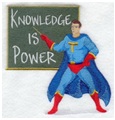|
 |
|
 |
|
|
||
Success
Success is... Doing the things you want i.e. achieving your objectives.
How to be successful
1. Purpose and principles Success is
Your life will be judged on your love and help for others, not your money, fame and possessions.
2. Challenge with patience
3. Do your best at what you do best You’ve got to be different to be successful and do something better than everybody else. So:
Your success in anything depends on effort, ability and external factors like luck and the people you know.
4. Lifelong learning Remember that knowledge is power – it gives you self-respect and influence. So become a lifelong, effective learner (through a love of learning, curiosity, listening, fast reading and improving your memory and concentration).
5. Change, creativity and continuous improvement Be prepared to change what you do and continually improve in your different roles (parent, child, friend, employee, etc.). So be creative by
6. Thought into action Quiet reflection gives you tranquillity and time to think about the right thing to do. Once you’ve decided, do it now! Don’t put off doing something difficult.
7. Self-knowledge Honestly assess your strengths and weaknesses, so that you can fully exploit your strengths and minimize the impact of your weaknesses.
8. Influence others Win people’s respect with your competence, character (from practising your principles) and charisma – see influencing people.
9. Health You can’t do anything without your health, so:
10. Remember the 4 C’s Success will involve:
Key quotes explained
“The first wealth is health” - Ralph Waldo Emerson (American philosopher, pictured right) Success depends on your health, so look after yourself! Emerson said that enthusiasm, principles and ambition are also vital. “Hitch your wagon to a star”, he said. Shakespeare also emphasized the importance of challenging yourself: “Tis but a base, ignoble mind that mounts no higher than a bird can soar”, the Duke of Gloucester says in Henry VI part 2.
“To thine ownself be true” - Polonius (in Hamlet by Shakespeare, pictured right). Be yourself and live the life you want based upon what you think is right and worthwhile (not necessarily what will give you fame and fortune).
“Far better to dare mighty things...than live in the grey twilight that knows not victory, nor defeat” - Theodore Roosevelt (American president, pictured right) Stretch yourself and strive to do great things. It is better to try and fail than never to try at all. So the Chinese philosopher, Lao Tzu, said that “failure is the foundation of success”. “Success is the ability to go from one failure to another with no loss of enthusiasm” , said the British prime minister, Winston Churchill.
“Seize the day” - Horace , Roman poet (pictured right) Make the most of every day, and “evaluate it as if it were your last”, said the Roman emperor and philosopher, Marcus Aurelius.
“Success is dangerous. One begins to copy oneself and to copy oneself is more dangerous than to copy others. It leads to sterility” - Pablo Picasso (Spanish artist, pictured right) Imitation is the enemy of success “if you’re not distinct, you’re extinct”, said the American management writer, Tom Peters. You should always be uniquely better than everybody else and be prepared to change, if necessary. “When you’re finished changing, you’re finished”, Benjamin Franklin, the American inventor and politician, said.
“God helps them that help themselves” - Benjamin Franklin (the American inventor and politician, pictured right) Your success is your responsibility, and you can’t blame anybody else, if things go wrong. Your future is how you make it, so work as hard as you possibly can to achieve your aims and ideals. Benjamin Franklin believed that living a useful life is much more important than earning lots of money.
“Poor and content is rich, and rich enough” - Iago (in Shakespeare’s Othello) Contentment is worth more than money, but success can cause discontent. The American songwriter, Irving Berlin (pictured right) , said “The toughest thing about success is that you’ve got to keep on being a success”.
Best books
Stephen Covey (pictured right) , The Seven Habits of Highly Effective People (1992) They are:
1. Be proactive Get up and do something positive, don’t just react to people and events.
2. Begin with the end in mind Set yourself clear, useful objectives.
3. Put first things first Do what’s important first.
4. Think win-win Seek mutual benefits in your relationships with others.
5. Seek first to understand, then to be understood Value empathetic two-way communication and see things from other people’s point of view.
6. Synergize Seek creative co-operation with others in groups.
7. Sharpen the saw Self-improvement with four aspects that need to be kept in balance:
In another book Covey added an eighth habit – to “find your voice and inspire others to find theirs” (i.e. you and others doing something unique and useful). (For more detail see The Seven Habits of Highly Effective People in the Business Books section.
Anthony Robbins (pictured right), Unlimited Power (1988) This book popularized the idea of neuro-linguistic programming (NLP), created by John Grinder and Richard Bandler. NLP says that success is dependent on:
Spencer Johnson (pictured right) , Who Moved My Cheese? (1998) A story about two mice (Sniff and Scurry) and two mouse sized people (Hem and Haw), who (in their search for cheese, the book’s metaphor for success) learn from the mice that they must:
Norman Vincent Peale (pictured right) , The Power of Positive Thinking (1952) Think positively – obstacles are there to be overcome, not used as an excuse for failure.
Sheryl Sandberg (pictured right) , Lean In (2013) Facebook's Chief Operating Officer says that success depends on fighting for your rights and work/life balance She shared family duties with her husband and leaves the office at 5.30 pm every day.
|
|
|
||
|
|
||
| Copyright © wisdomtowin.com 2025 All Rights Reserved | ||
|
























